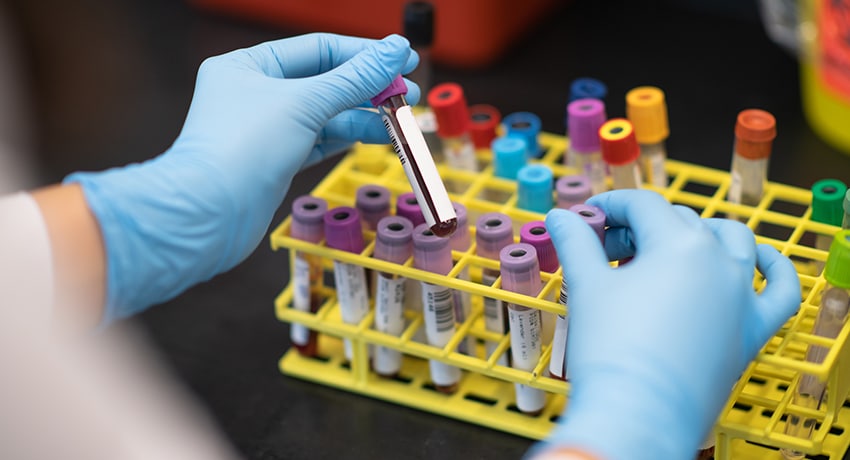Advancements in genetic testing have given consumers the ability to test for Alzheimer’s disease and learn their risk level. A simple blood test consumers can take on their own through a lab evaluates levels of amyloid beta proteins, which are known to form plaques in the brain and are linked to the progression of Alzheimer’s. This opportunity, however, brings up questions and concerns experts believe should be considered before jumping on board.
Should you do it?

Genetic tests are good in the right context, said Paul Schulz, MD, neurologist with UTHealth Houston Neurosciences and professor and director of the Neurocognitive Disorders Center with McGovern Medical School at UTHealth Houston.
In his daily work, Schulz uses these types of genetic tests to help evaluate risks in studies. Schulz shares with patients their blood test is in a range that could qualify for a study, and he’d like to do an amyloid PET scan as the next step.
“We don’t want to give them unnecessary anxiety by telling them they’re in the high-risk group and have an 80% chance of amyloid pathology,” Schulz said. “They could be part of the 20% in that 80% who don’t get Alzheimer’s.”
None of the tests are 100% accurate, because the data doesn’t lend itself to that. Schulz said it’s a compromise between sensitivity and specificity. It will suggest that some are positive but aren’t and others who are negative, but are actually positive. The problem occurs when someone gets a result on a Friday afternoon, Schulz said, and doesn’t know what group they’re in and who to ask. It’s especially concerning when people don’t have any symptoms. The test suggests someone has amyloid, not that they have Alzheimer’s disease.
“It’s a tough situation because the test is slightly useful in the best of circumstances,” Schulz said. But it recognizes a risk, not the actual gene. Having a risk doesn’t automatically mean someone will get Alzheimer’s disease – just like high blood pressure is a risk for heart attacks, but not everybody gets a heart attack.
Learnings from the early days of genetic tests
Since genetic tests first became available to neurologists in 1992, Schulz said they have learned a lot – especially regarding people’s reactions to the results that reveal whether they have a disease.
The first genetic test available was the Huntington’s disease gene test, where you either have the gene and the disease or you don’t have the gene or the disease.
“We all thought in 1992 that people would probably want to get tested, because if they’re negative, that’s really valuable, and if they’re positive, maybe they would want to know and plan for it,” Schulz said.
This idea didn’t go as expected. Schulz said the people who tested negative were not happy, as they thought, because there’s a 50/50 shot with the gene. If the brother didn’t have it, then the sister did, and the brother would feel guilty about being the lucky one. As a result, Schulz said the Huntington’s disease gene test is used sparingly now.
Be prepared
Schulz said the worst thing to do is take a genetic test, get a bad result, and try to figure out what it means. Instead, he suggests seeing a physician before getting the test, so people are prepared psychologically for whether they want to know the results or not – and to help interpret them.
What is your personality? Do you want to know everything? Schulz describes patients with a proactive view who want to know if they’re positive. For those who are on the fence about these kinds of genetic tests, Schulz believes people in a study are better off, psychologically, and able to digest what the results would mean.
“I think people are OK knowing they’re going to be in a trial if it’s positive,” Schulz said.
He does not recommend the children of Alzheimer’s patients, in their 40s or 50s, get tested for the gene their parent has.
“Don’t get the test now and worry to death for 20 years, and then find out we have a cure anyway,” Schulz said. “I hope we have something that cures or prevents Alzheimer’s for people with that gene by the time they’re at risk.”



